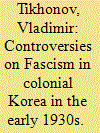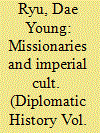| Srl | Item |
| 1 |
ID:
115052


|
|
|
|
|
| Publication |
2012.
|
| Summary/Abstract |
The paper deals with the trends of fascist and fascist-like right-wing social and political thought in colonial Korea in the early 1930s. It shows that in the 1920s, Korea's right wing, its ability to reach out to the masses being severely limited, preferred mostly conciliatory tactics in its relationship with leftist radicals, often making efforts towards inventing 'hybrid' ideologies which would integrate the leftist social concerns into the mainstream religious or nationalist constructions (an example of such a hybrid were various Korean versions of Christian socialism). After the Great Depression, however, Korea's nascent bourgeoisie felt more threatened and became more interested in keeping abreast with right-wing extremist trends in the mother country (Japan) and elsewhere. Such representative ideologists of the Korean propertied class as Yun Ch'iho and Yi Kwangsu were praising Mussolini and employing strong Social Darwinist language in their exhortations to the Korean people to 'regain their vitality and develop [a] spirit of collectivism, obedience and self-sacrifice'. However, until the very end of the 1930s many of Korea's right-wing ideologues remained pronouncedly religious (Yun as Christian, Yi as Buddhist). While highlighting the religious essentials of their worldviews they often abstained from imitating the most extremist traits of European fascist ideologies (for example, anti-Semitism). In many ways, Korea's fascism continued until the end of the 1930s to be an intellectual discourse rather than a mass movement, and retained a strong aura of belonging to more mainstream religious or nationalist traditions.
|
|
|
|
|
|
|
|
|
|
|
|
|
|
|
|
| 2 |
ID:
098369


|
|
|
|
|
| Publication |
2010.
|
| Summary/Abstract |
Chinese emigrants or kaky? occupy an important but little acknowledged niche in the history of modern Japan. They mediated Japan's relations with China and the West in the Meiji period, they competed against Japanese economic interests in Korea before and after it became a Japanese colony, and they were a controversial source of labour for the Japanese economy. This article recovers the history of Chinese migrants in Japan and Korea in the late nineteenth and early twentieth century paying special attention to the ambivalent Japanese attitude toward them. This study not only contributes to a fuller understanding of modern Japanese history but also offers historical insights into Japan-China relations in the twenty-first century as Chinese migration to Japan again causes public concern.
|
|
|
|
|
|
|
|
|
|
|
|
|
|
|
|
| 3 |
ID:
147564


|
|
|
|
|
| Summary/Abstract |
State Shinto was established in colonial Korea to assimilate the Korean population. Although the Japanese government declared the Shinto ceremonies as non-religious, patriotic rituals, they consisted of traditional Shinto rites. When the Japanese authorities began forcing attendance at Shinto shrine rites, two American Presbyterian missions in Korea refused to cooperate. Their uncompromising attitude enraged the Japanese authorities, and embarrassed the American diplomatic establishment and accommodative members of the missionary community. As the Shinto shrine issue developed into a public controversy, American diplomats had to protect the national priorities over and against the private interests of missionaries.
|
|
|
|
|
|
|
|
|
|
|
|
|
|
|
|